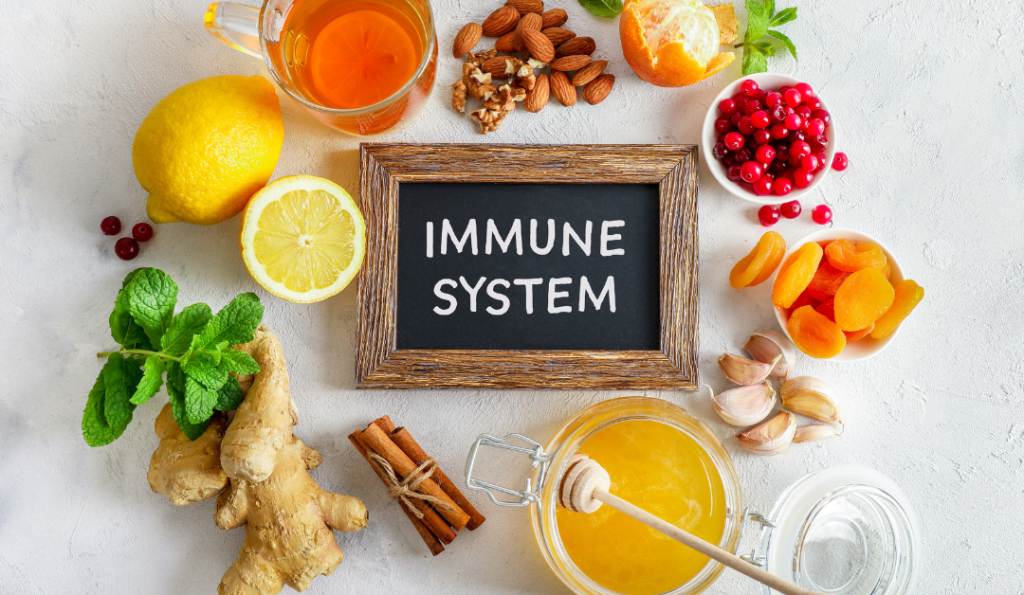Subtotal $0.00
The immune system is a complex network of cells, tissues, and organs that work together to defend the body against foreign invaders, such as bacteria, viruses, parasites, and other pathogens. Its primary function is to identify and neutralize these invaders while distinguishing them from the body’s own healthy cells and tissues. The immune system plays a crucial role in maintaining overall health and protecting the body from infections and diseases.
There are two main components of the immune system:
- Innate Immune System: This is the body’s first line of defense and provides immediate, nonspecific protection against pathogens. It includes physical barriers such as the skin and mucous membranes, as well as immune cells like macrophages, neutrophils, and natural killer cells. These cells detect and destroy pathogens through mechanisms like phagocytosis and inflammation.
- Adaptive Immune System: This component of the immune system provides a more targeted and specific response to pathogens. It involves specialized immune cells called lymphocytes, including B cells and T cells, which are capable of recognizing specific antigens associated with pathogens. The adaptive immune system generates a tailored response to each pathogen encountered, leading to the production of antibodies by B cells and the activation of T cells to eliminate infected cells.

The immune system also has memory capabilities, which allow it to remember past encounters with pathogens. This memory enables a faster and more effective response upon subsequent exposure to the same pathogen, providing immunity against reinfection. Everyone should maintain a healthy lifestyle that is essential for human body. Factors such as a balanced diet, regular exercise, adequate sleep, stress management, and vaccinations can all contribute to supporting immune function. Additionally, certain medical conditions, medications, and lifestyle factors can affect immune health, so it’s important to take proactive steps to support and strengthen the immune system.
Here are some tips that may help:
• Healthy Diet: Eat a balanced diet like as fruits, vegetables, whole grains, lean proteins, and healthy fats. Include foods high in vitamin C (such as oranges, strawberries, and bell peppers), vitamin D (found in fatty fish, fortified dairy products, and sunlight), and zinc (found in nuts, seeds, and legumes) as they support immune function.
• Stay Hydrated: Drink plenty of water throughout the day to keep your body hydrated, which supports immune function and helps flush out toxins.
• Adequate Sleep: Aim for 7-9 hours of quality sleep per night. Poor sleep can weaken your immune system and make you more susceptible to infections.
• Regular Exercise: Engage in moderate exercise most days of the week. Exercise boosts circulation, promotes good cardiovascular health, and can enhance immune function.
• Stress Management: Chronic stress can suppress immune function. Practice stress-reducing activities such as meditation, deep breathing exercises, yoga, or spending time in nature.
• Maintain a Healthy Weight: Obesity can impair immune function, so strive to maintain a healthy weight through a combination of diet and exercise.
• Limit Alcohol and avoid Smoking: Excessive alcohol consumption and smoking can weaken the immune system. Limit alcohol intake and avoid smoking to protect your immune health.
• Stay Hygienic: Wash your hands frequently with soap and water, especially before eating or touching your face, to prevent the spread of germs.
• Supplements: Consider taking supplements if you have deficiencies in certain vitamins or minerals. However, it’s best to get nutrients from food whenever possible. Consult with a healthcare professional before intake any new supplement.
• Herbal Remedies: Some herbs and botanicals have immune-boosting properties, such as Echinacea, elderberry, garlic, and ginger. Incorporate them into your diet or consider herbal supplements, but again, consult with a healthcare provider before use.
• Probiotic: Gut health is closely linked to immune function. Incorporate probiotic-rich foods like yogurt, kefir, sauerkraut, and kimchi into your diet to support a healthy balance of gut bacteria.
• Social Connection: Maintain strong social connections with friends and family, as loneliness and social isolation can weaken the immune system.
• Vaccination: Stay up-to-date on vaccinations recommended by healthcare professionals to protect against infectious diseases.

Remember that consistency is key. Making these practices a part of your daily routine can help support a strong and resilient immune system over time. However, Before taking any suppliments it’s essential to consult with a healthcare professional if making significant changes to your lifestyle or starting any new supplements.


